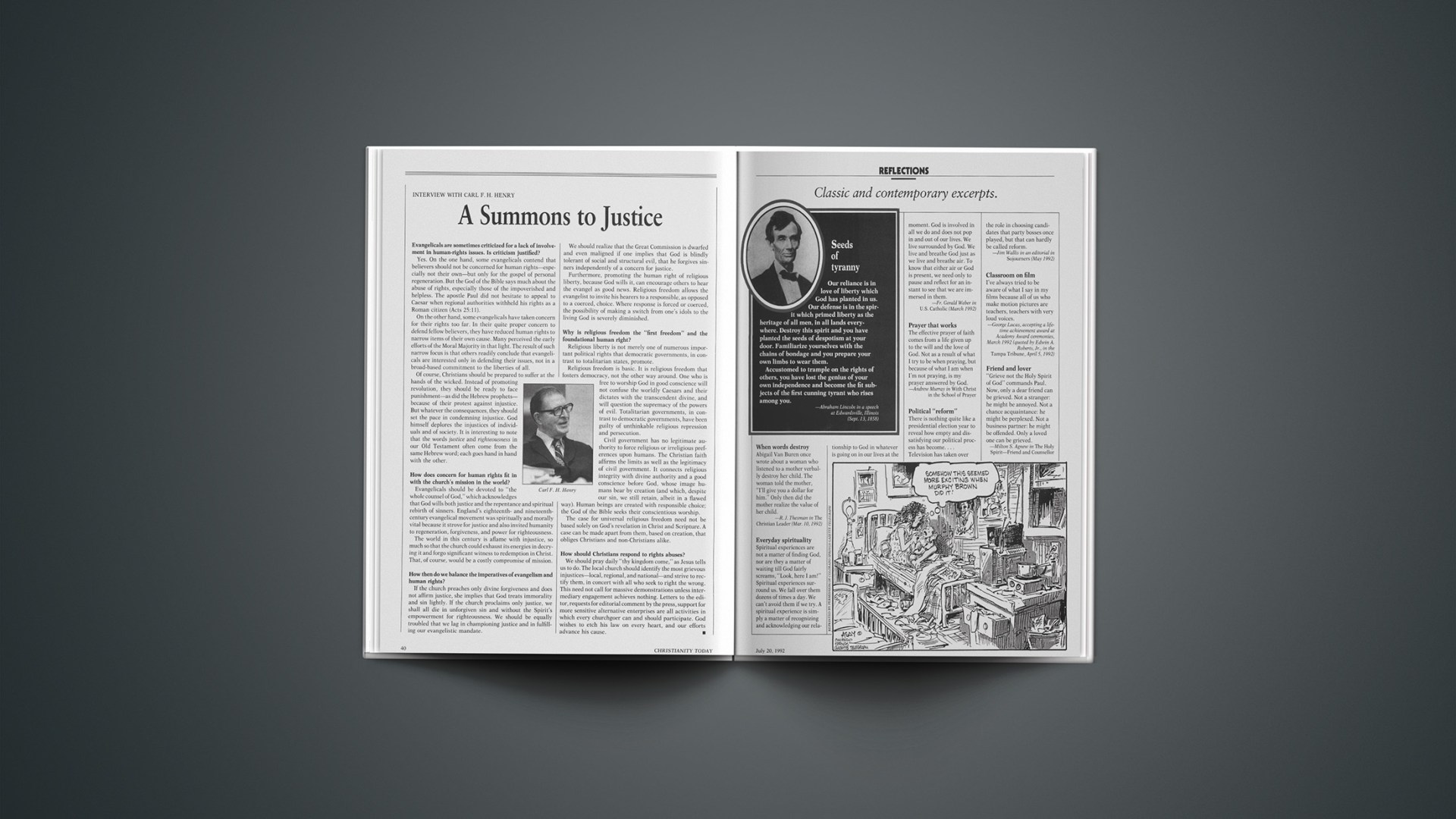Evangelicals are sometimes criticized for a lack of involvement in human-rights issues. Is criticism justified?
Yes. On the one hand, some evangelicals contend that believers should not be concerned for human rights—especially not their own—but only for the gospel of personal regeneration. But the God of the Bible says much about the abuse of rights, especially those of the impoverished and helpless. The apostle Paul did not hesitate to appeal to Caesar when regional authorities withheld his rights as a Roman citizen (Acts 25:11).
On the other hand, some evangelicals have taken concern for their rights too far. In their quite proper concern to defend fellow believers, they have reduced human rights to narrow items of their own cause. Many perceived the early efforts of the Moral Majority in that light. The result of such narrow focus is that others readily conclude that evangelicals are interested only in defending their issues, not in a broad-based commitment to the liberties of all.
Of course, Christians should be prepared to suffer at the hands of the wicked. Instead of promoting revolution, they should be ready to face punishment—as did the Hebrew prophets—because of their protest against injustice.
But whatever the consequences, they should set the pace in condemning injustice. God himself deplores the injustices of individuals and of society. It is interesting to note that the words justice and righteousness in our Old Testament often come from the same Hebrew word; each goes hand in hand with the other.
How does concern for human rights fit in with the church’s mission in the world?
Evangelicals should be devoted to “the whole counsel of God,” which acknowledges that God wills both justice and the repentance and spiritual rebirth of sinners. England’s eighteenth-and nineteenth-century evangelical movement was spiritually and morally vital because it strove for justice and also invited humanity to regeneration, forgiveness, and power for righteousness.
The world in this century is aflame with injustice, so much so that the church could exhaust its energies in decrying it and forgo significant witness to redemption in Christ. That, of course, would be a costly compromise of mission.
How then do we balance the imperatives of evangelism and human rights?
If the church preaches only divine forgiveness and does not affirm justice, she implies that God treats immorality and sin lightly. If the church proclaims only justice, we shall all die in unforgiven sin and without the Spirit’s empowerment for righteousness. We should be equally troubled that we lag in championing justice and in fulfilling our evangelistic mandate.
We should realize that the Great Commission is dwarfed and even maligned if one implies that God is blindly tolerant of social and structural evil, that he forgives sinners independently of a concern for justice.
Furthermore, promoting the human right of religious liberty, because God wills it, can encourage others to hear the evangel as good news. Religious freedom allows the evangelist to invite his hearers to a responsible, as opposed to a coerced, choice. Where response is forced or coerced, the possibility of making a switch from one’s idols to the living God is severely diminished.
Why is religious freedom the “first freedom” and the foundational human right?
Religious liberty is not merely one of numerous important political rights that democratic governments, in contrast to totalitarian states, promote.
Religious freedom is basic. It is religious freedom that fosters democracy, not the other way around. One who is free to worship God in good conscience will not confuse the worldly Caesars and their dictates with the transcendent divine, and will question the supremacy of the powers of evil. Totalitarian governments, in contrast to democratic governments, have been guilty of unthinkable religious repression and persecution.
Civil government has no legitimate authority to force religious or irreligious preferences upon humans. The Christian faith affirms the limits as well as the legitimacy of civil government. It connects religious integrity with divine authority and a good conscience before God, whose image humans bear by creation (and which, despite our sin, we still retain, albeit in a flawed way). Human beings are created with responsible choice; the God of the Bible seeks their conscientious worship.
The case for universal religious freedom need not be based solely on God’s revelation in Christ and Scripture. A case can be made apart from them, based on creation, that obliges Christians and non-Christians alike.
How should Christians respond to rights abuses?
We should pray daily “thy kingdom come,” as Jesus tells us to do. The local church should identify the most grievous injustices—local, regional, and national—and strive to rectify them, in concert with all who seek to right the wrong. This need not call for massive demonstrations unless intermediary engagement achieves nothing. Letters to the editor, requests for editorial comment by the press, support for more sensitive alternative enterprises are all activities in which every churchgoer can and should participate. God wishes to etch his law on every heart, and our efforts advance his cause.










